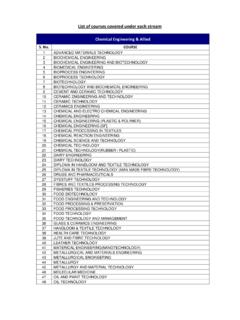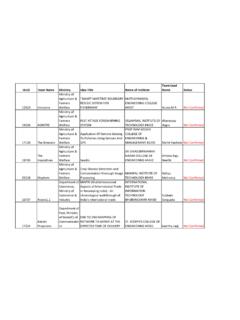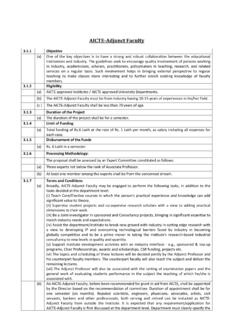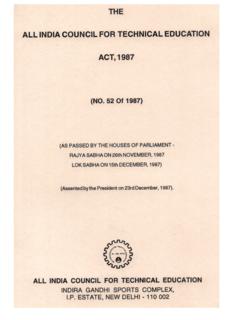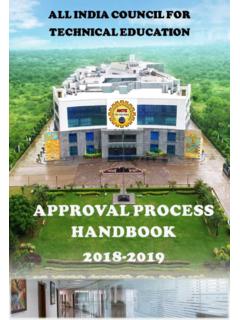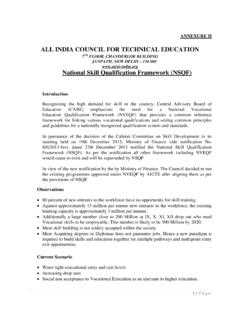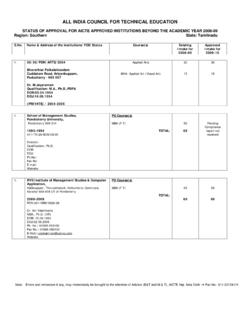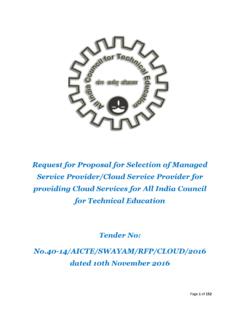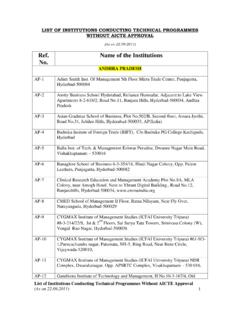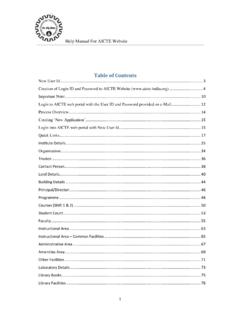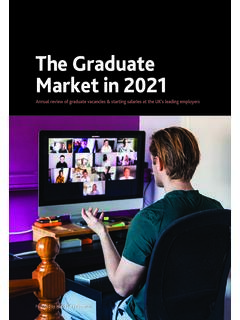Transcription of Vol. I Final AICTE Curriculum
1 02'(/ &855,&8/80 )25 81'(5*5$'8$7( '(*5(( &2856(6 ,1 (1*,1((5,1* 7(&+12/2*<-DQXDU\ 9 ROXPH , $// ,1',$ &281&,/ )25 7(&+1,&$/ ('8&$7,211 HOVRQ 0 DQGHOD 0 DUJ 9 DVDQW .XQM 1HZ 'HOKL ZZZ DLFWH LQGLD RUJ Prakash Javadekar Minister of Human Resource Development Government of India Message India is a diverse economy and students of today will be the young leaders of tomorrow. India is renowned in producing students of high calibre and it is necessary that our aspiring students are able to pursue the right education. As we are all aware that engineering education is gaining new heights and contributes a substantial share in the overall education system, the youngsters pursuing engineering studies need to be well equipped and updated with the latest technological trends and industrial requirements. This is possible only when the students undergo studies with an updated and evolving Curriculum to match global scenario.)))))))))))
2 I congratulate AICTE for developing a model Curriculum with the help of academic and industry experts for various disciplines of Undergraduate Degree courses in engineering & Technology which will be available for Universities and Institutions. This adoption will be advantageous for the students to enhance their skills and employability. Introduction of mandatory Induction program for students belonging to diverse backgrounds to adjust themselves in the new environment of engineering degree courses is praise worthy. An initiative to be continued in future as PREFACE There has been a concern about quality of technical education in India although in terms of access and equity, India has done very well. AICTE is mandated for planned and coordinated development of Technical Education; regulate proper maintenance of norms & standards and expansion of technical Education with Quality. Accordingly, AICTE in its 49th meeting of the Council held on approved a package of measures for improving quality of technical education in the country.
3 Revision of Curriculum , Mandatory internship and Induction Program were amongst the few major quality initiatives taken by AICTE . AICTE , in consultation with MHRD constituted subject-wise Heads of the Committees with a respective team of academic experts along with industry expert to draft the model Curriculum of UG engineering courses along with Induction Program for students . During the meetings held for developing model Curriculum for undergraduate engineering courses, a concern was shared that in the present system, the first year syllabus is heavily loaded and it is of utmost importance that the students entering into the first year of an engineering course should feel at ease by lowering the burden of syllabus and credits. This is necessary for a student to acclimatize to the new environment of a college and to create a bonding between the teacher and a student. An idea to introduce induction program in the Curriculum to equip the students with communication skills, and get them acquainted with the culture of institution and human values was formalized.
4 A student has to undergo this induction program after joining the institute and before the commencement of classes. Normal classes of the engineering program shall begin after the students have undergone a three-weeks induction program. The Induction program for students comprises of Physical activities; Learning an art form; Literature Social Awareness; Lectures Universal Human Values; Familiarization to Department/Branch, College& Innovations. To sensitize on the need of induction program, one-day workshops for Principals/ Directors/ Promoters of Society/Trust/Institutions were held at Hyderabad, Bangalore, Mumbai, Kolkata and Delhi. Subsequently, five-day Teacher Training workshops for Student induction were also held at Hyderabad, Varanasi and Pune. Also, AICTE has made 6-8 weeks summer internships mandatory before completion of under graduation. This will equip the students with practical understanding and training about industry practices in a suitable industry or organization.
5 A novel concept of Virtual Laboratories has also been introduced in the Model Curriculum . MHRD has successfully completed two phases of project under NPTEL, to develop Virtual Labs through a consortium headed by IIT Delhi. During these phases, more than 180 labs were developed, comprising of more than 1700 experiments, in different domains of engineering . These experiments are field tested through various nodal centres across the country. The Virtual Labs. essentially comprise of a user-friendly graphical front. It would be a far enriching experience to use virtual labs and learn at one s own pace and time. A student can even learn the skills which are not part of the Curriculum but required as professionals to take up new challenges. A chapteron Virtual Laboratories: A new way of Learning is a part of this Model Curriculum . It was also felt that students should get holistic education which has components of sports, physical activities, values and ethics.
6 The respective Heads of the Committees & teams discussed the existing system prevalent in engineering colleges, industry requirements and market trends, employability, problem solving approach, need for life long learning and after due deliberations, the scheme and syllabus for various engineering disciplines have been formalized. Salient features of this model Curriculum are enumerated below: i. Induction program has been made a part of this Model Curriculum . ii. Model Curriculum has been designed in such a way that it encourages innovation and research as total number of credits have been reduced and many new courses have been incorporated in consultation with industry experts. iii. The revised Model Curriculum has been designed where the students can understand the industry requirements and have hands-on experience. The students will develop a problem solving approach and will be able to meet the challenges of future.
7 Iv. It is also understood that different engineering disciplines should have some flexibility in being different. All engineering disciplines cannot be made to conform to a fixed structure. Though, AICTE has compiled a common first year scheme and syllabi for engineering disciplines, the concerned Institution/ University may adjust the scheme and courses as per the requirement of particular Institute and local needs. However, the total credit structure of 160 credits should not be disturbed. The institutions/ universities in India are requested to adopt this Model Curriculum for various undergraduate degree engineering disciplines. v. Courses on Constitution of India, Environment Science/Engg. and Essence of India Traditional Knowledge have also been included in the Curriculum . vi. A novel concept of Virtual laboratories has been introduced in the model Curriculum .
8 Vii. Curriculum on Entrepreneurship is included to support AICTE s start-up policy. viii. In some disciplines, courses have been mentioned in the scheme, it is left to the University/Institution to frame the detailed syllabus as per their need or can find the same in the AICTE model Curriculum of some other disciplines in this booklet. ix. AICTE will ensure the revision of the model Curriculum on regular basis and this updation will certainly help students to achieve better employability; start-ups and other avenues for higher studies. ** ACKNOWLEDGEMENT The development of an outcome based Model Curriculum for Undergraduate degree courses in engineering & Technology is a result of thoughtful deliberations at various stages of dedicated and specialized experts. This model Curriculum has been framed to meet the expectations of an academically challenging environment, develop problem solving skills by students , align with current standards and to enrich the students learning to make them self-enablers and/or match job requirements on successful completion of their degree.
9 I wish to acknowledge all our esteemed experts who have been involved in the process of developing this outcome based model Curriculum for various disciplines of undergraduate courses for adoption at various engineering Institutions and Universities. We are thankful to our Heads of the committees of different branches Prof. Anurag Mehra; Dr. Singh ;Dr. Shevgaonkar; Prof. T. Sundararajan; Prof. Prathap Haridoss; Prof. Anupam Basu; Dr Anil Kulkarni; K. Sarma, ; Prof. B. L. Tembe and Prof. Manoj Harbola with their team of Academic and Industry experts who were devotedly committed towards framing this model Curriculum for various engineering disciplines. We are thankful to Prof. Rajeev Sangal, Director (IIT-BHU)and his teamfor developing a Guide to Induction Program along with mandatory and humanities courses. AICTE also acknowledges Bharatiya Vidya Bhawan for developing mandatory course on Essence of Indian Traditional Knowledge.
10 A novel concept of Virtual Labs. has been introduced in the Model Curriculum to provide remote-access to Labs in various disciplines of Science and engineering . I am extremely thankful to Prof. Agashe for preparing contents of Virtual Laboratories for various engineering disciplines. I am greatly gratified to Shri R. Subrahmanyam, Special Secretary, MHRD for his supervision, contribution, guidance and support throughout the development of this model Curriculum . Special thanks and gratitude to Prof. Anil D. Sahasrabdhe, Chairman; Prof Poonia, Vice Chairman and Prof. Mittal, Member Secretary, AICTE who all have been instrumental and encouraging throughout the process of developing this model Curriculum . I like to appreciate the officers and officials of Policy & Academic Planning Bureau, in particular the dedication put in by Ms. Neera Kakkarby compiling the inputs from the experts and coordinating the whole process.
